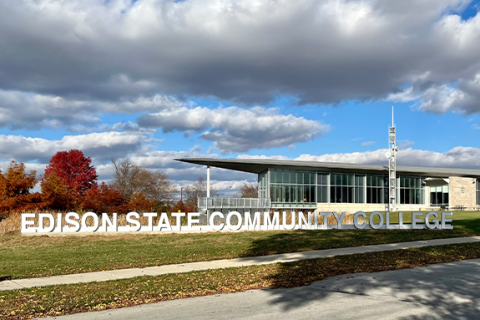Military & Veterans
We will support you as you embark upon your educational journey.
Thank you for your service.
Edison State Community College recognizes the tremendous contribution that veterans and reservists make as citizens and students. We are proud of the level of diversity, experience and academic excellence that you bring to our campus.
The Edison State Office of Veterans Services gives you and your family a single point of contact. We provide academic, referral and personal support services to help ease access to higher education, foster success and build community. We also network with area veterans organizations to provide support services to veterans on campus.
mission
Our mission is to assist veterans and their dependents in obtaining educational benefits. Our office can guide students through the proper process for attaining their eligibility, benefits and other needs.
Explore support and amenities available to you.
Edison State offers a number of support services and amenities for veterans and their families including
- Veterans Lounge Located in the West Hall of the Piqua campus, the Veterans Lounge serves as a quiet study place for veterans.
- Financial Aid Assistance You are encouraged to explore all available financial aid opportunities. Our Financial Aid Specialists can assist you in applying for and utilizing your benefits and other aid. Please review our Steps for Veterans Benefits information found below.
- Academic Advising Educational planning and advising. Special emphasis on credit for skills gained in military services.
Tutoring Center Referrals to the Tutoring Center at Edison State, as needed. - Counseling | Referrals Short-term counseling and appropriate campus and community referrals.
- Career & Job Services Assistance with choosing a career, writing a resume and securing employment.
Health Services Assistance with obtaining immunization records or temporary waivers. Service for injuries and medical issues while on campus. - Accessibility & Disability Support Services Coordination of documentation of disabilities for appropriate accommodations.
- Ohio Department of Veterans Resources Learn about the resources and benefits available for Ohio's veterans.
Review veterans benefits.
Edison State Community College, through the U.S. Department of Veterans Affairs, certifies benefits for a variety of education benefit programs for eligible veterans while in attendance at the college. The links below will redirect you to the GI Bill® website for specific information on available programs, as well as tools to help you determine your eligibility and apply for your benefits. You may be eligible for several types of VA education and training benefits. We recommend that you visit the VA Education Benefit Programs Comparison Tool, GI Bill® Comparison Tool/Benefit Estimator and the Education and Training Rate Tables to get started.
Please review the information below detailing the various benefit programs that you may be eligible to participate in. We encourage you to review our Steps for Veterans Benefits information. These steps will help us to advance your enrollment and make the most of your benefits.
Explore additional information.
To receive Edison State Tuition Assistance (TA), you must first work with your Educational Services Officer (ESO) or counselor in your military service branch to determine eligibility.
NOTE Once your eligibility is determined, provide your Statement of Eligibility contract to our Veteran Services Specialist listed on this page.
To comply with the new Department of Defense policy, Edison State Community College will return any unearned TA funds based on a prorated basis through at least the 60% portion of the period for which the funds were provided. TA funds are earned proportionally during an enrollment period, with unearned funds returned based upon when a student stops attending. These funds are returned to the military service branch.
If or when a service member stops attending due to a military service obligation, the educational institution will work with the affected service member to identify solutions that will not result in student debt for the returned portion. The affected service member should also check with his/her funding source for the impact that dropping a course(s) and tuition refund approval may have on funding.
The Educational Assistance Test Program (Section 901) was created by the Department of Defense Authorization Act of 1981. Unlike other GI Bills®, the eligibility window for this one was very narrow. Enlistees had to enter active duty after September 30, 1980 but before October 1, 1981. For those enlisting under the Delayed Entry Program, their entry date was extended to October 1, 1982.
The Educational Assistance Test Program (Section 901) was unique from all other GI Bill programs in that individuals had to be selected by the service branch to participate, so consequently not everyone entering active duty during the eligibility period qualified for benefits. The Air Force restricted eligibility to those enlisting only in certain specialties and from certain recruiting locations. Section 901 participation did not require any monetary contribution from service members, unlike the $1,200 contribution required by the Montgomery GI Bill that came along in 1984.
Eligibility
For selected individuals, eligibility could be acquired in two ways, either through an initial enlistment or reenlistment. To maintain eligibility, however, individuals had to fulfill their contracted enlistment period, serve at least 24 continuous months on active duty, or if less than 24 months, draw compensation for a service-connected disability.
First-term enlistees could still qualify for the Educational Assistance Test Program (Section 901) if their discharge met one of the following requirements:
- It was for convenience of the government
- Due to hardship
- A result of a disability incurred or aggravated during service
Another unique feature of Section 901 was that eligibility could be maintained even if the service member's discharge was characterized as "general". Normally, only an honorable discharge maintains GI Bill eligibility.
Edison State may award credits to veterans for military training and experience. To be considered for credit, please order a copy of your Army/AARTS transcript, or Sailor/Marine/ARTS transcript or Air Force/CCAF transcript, and provide a copy of your DD214 to Edison State Community College Office of Registration and Records. Credit will be awarded and will appear on your transcript as military credit. There is no charge for the posting of military credit.
The Montgomery GI Bill (MGIB) is available to those who enlist in the U.S. Armed Forces. There are two primary programs as described below.
- Montgomery GI Bill Active Duty (MGIB-AD) For active duty members who enroll and pay $100 per month for 12 months and are then entitled to receive a monthly education benefit once they have completed a minimum service obligation.
- Montgomery GI Bill Selected Reserve (MGIB-SR) For reservists with a six-year obligation in the selected reserve who are actively drilling.
Click below for an Edison State checklist that will help us to advance your enrollment.
The National Call to Service Program is a benefit provided to those who perform a period of national service. It is a Department of Defense program that is administered by the Veterans Administration.
Type of Assistance
Participants who elect to receive an educational assistance incentive are not entitled to additional assistance under Chapter 1606 or Chapter 30 benefits unless the participant completes the service requirements necessary to establish eligibility. An individual who receives benefits under this program who also establishes eligibility under Chapter 1606 or Chapter 30 will have those entitlements reduced accordingly.
Available Benefit and Eligibility
Participants can choose from the following incentives:
- Cash bonus of $5,000
- Repayment of a qualifying student loan not to exceed $18,000
- Entitlement to allowance equal to the three-year monthly Montgomery GI Bill Active-Duty rate for 12 months
- Entitlement to allowance equal to 50 percent of the less than three-year monthly Montgomery GI Bill Active-Duty rate for 36 months
- Coordination with Montgomery GI Bill Benefits
Eligibility
There is a three-tiered service requirement to qualify for incentives under the National Call to Service program:
- First, after completion of initial entry training, individuals must serve on active duty in a military occupational specialty designated by the Secretary of Defense for a period of 15 months.
- After this, and without a break in service, these individuals must serve either an additional period of active duty as determined by the Secretary of Defense, or a period of 24 months in an active status in the Selected Reserve.
- After completion of this period of service, and without a break in service, the remaining period of obligated service specified in the agreement will be served as follows:
• On active duty in the armed forces
• In the Selected Reserve
• In the Individual Ready Reserve
• In AmeriCorps, or another domestic national service program jointly designated by the Secretary of Defense and the head of such a program
Any combination of the service referred to above may also be approved by the Secretary of the military department concerned pursuant to regulations prescribed by the Secretary of Defense and specified in the agreement.
The Post-9/11 GI Bill® is available to you if you have at least 90 days of aggregate active duty service after September 10, 2001, and are still on active duty, or if you are an honorably discharged veteran or were discharged with a service-connected disability after 30 days, you may be eligible for this VA-administered program.
If you have eligibility for the Post-9/11 GI Bill and any other GI Bill program you must make an irrevocable election of the Post-9/11 GI Bill before you can receive any benefits.
Benefits and Eligibility
For approved programs, the Post-9/11 GI Bill provides up to 36 months of education benefits, generally payable for 15 years following your release from active duty. Institutions of higher learning participating in the Yellow Ribbon Program may make additional funds available for your education program without an additional charge to your GI Bill entitlement. The following payments may also be available:
- Monthly housing allowance
- Annual books and supplies stipend
- One-time rural benefit payment
To see the current payment rates for the Post-9/11 GI Bill click here.
Some service members may also transfer unused GI Bill benefits to their dependents.
Other Factors to Consider
- Full tuition and fees are paid directly to the school for all public school in-state students.
- For those attending private or foreign schools, tuition and fees are capped at the national maximum rate.
- If you're attending a private or a public institution of higher learning (either private or public) as a nonresident, out-of-state student you may be eligible for the Yellow Ribbon Program and entitled to additional education-related costs not covered by VA. Not everyone is eligible for this assistance.
Click below for an Edison State checklist that will help us to advance your enrollment.
There are two primary GI Bill® programs offering education assistance to survivors and dependents of veterans.
The Marine Gunnery Sergeant John David Fry Scholarship (Fry Scholarship) is currently available for children of those who died in the line of duty after September 10, 2001. Beginning January 1, 2015, the Fry Scholarship will also be available for surviving spouses of those who died in the line of duty after September 10, 2001.
The Survivors' and Dependents' Educational Assistance (DEA) Program offers education and training opportunities to eligible dependents of veterans who are permanently and totally disabled due to a service-related condition or of veterans who died while on active duty or as a result of a service-related condition.
For information on the transferability option of the Post-9/11 GI Bill click here.
Click below for an Edison State checklist that will help us to advance your enrollment.
The Veterans Educational Assistance Program (VEAP) is available if you elected to make contributions from your military pay to participate in this education benefit program. The government matches your contributions on a 2-for-1 basis.
Types of Training
Assistance may be used for college degree and certificate programs, technical or vocational courses, flight training, on-the-job training or apprenticeships, high-tech training, licensing and certification tests, entrepreneurship training, certain entrance examinations and correspondence training. In certain circumstances, remedial, deficiency and refresher training may also be available.
Available Benefits and Eligibility
Benefit entitlement is for one to 36 months depending on the number of monthly contributions. You have 10 years from your release from active duty to use VEAP benefits. If the entitlement is not used after the 10-year period, your portion remaining in the fund will be automatically refunded.
Eligibility
You must meet the following requirements to qualify:
- Entered service for the first time between January 1, 1977–June 30, 1985
- Opened a contribution account before April 1, 1987
- Voluntarily contributed from $25–$2,700
- Completed your first period of service and were discharged or released from service under conditions other than dishonorable
- If you are currently on active duty and wish to receive VEAP benefits, you must have at least three months of contributions available
The Vocational Rehabilitation and Employment (VR&E) Education and Career Counseling program is a great opportunity for service members and veterans to get personalized counseling and support to help guide their career paths and ensure the most effective use of their VA benefits to achieve their goals.
Eligibility
- Transitioning service members within six months prior to discharge from active duty
- Veterans within one year following discharge from active duty
- Any service member or veteran currently eligible for a VA education benefit
- All current VA education beneficiaries
Services include
- Career Choice Understand the best career options for you based on your interests and capabilities
- Benefits Coaching Guidance on the effective use of your VA benefits and/or other resources to achieve your education and career goals
- Personalized Support Academic or adjustment counseling and personalized support to help you remove any barriers to your success
Follow these steps
- Download the the Educational/Vocational Counseling Application (VA Form 28-8832).
- Print, complete and mail the form to your nearest VA Regional office.
- If it is determined that you are eligible, you will be invited to attend an orientation session at your nearest VA Regional Office.
Click below for an Edison State checklist that will help us to advance your enrollment.
Edison state Commitment
The following policies articulate the College's commitment to Veterans Services.
Board of Trustee's Veterans Services Policy
Military Institutional Support Policy
Veterans Services Call to Active Duty Policy
Veterans Services Community Cooperation Policy
Veterans Services Military Credit Policy








